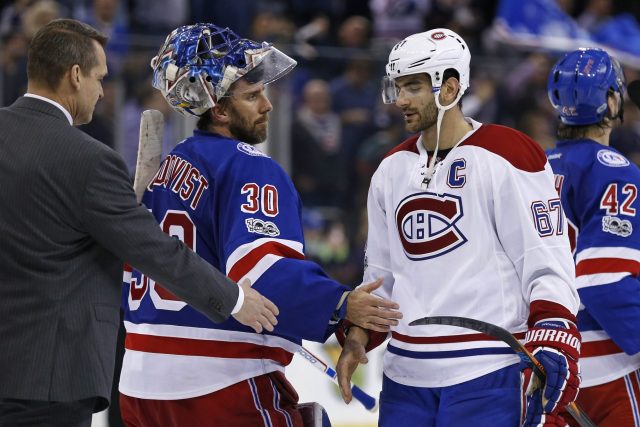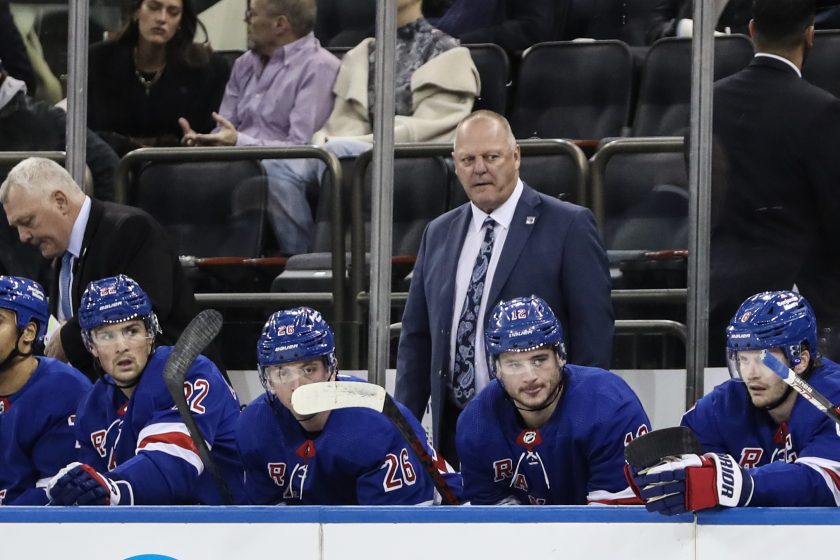The New York Rangers Newfound Ability to Adapt to be Tested Again by Ottawa Senators

The New York Rangers newfound ability to adapt, as seen in the first round, will be quickly tested again in the form of the Ottawa Senators.
[dropcap]T[/dropcap]he New York Rangers‘ impressive surge past the Montreal Canadiens in the final three games of their first-round playoff series left them with four full days to rest, heal some bumps and bruises and even reflect a little on the strength of their performance.Most importantly, perhaps, it gives them the chance to embrace how their ability to almost perfectly morph their game to that of their opponent’s was the key factor in advancing.
“There were question marks with our group, physicality-wise, and this is one of the more physical series I’ve been a part of,” defenseman Marc Staal told Brett Cyrgalis of the New York Post after the Game 6 clincher Saturday. “There wasn’t a lot of room out there, a lot of ice, and we fought for every inch right there with them — and came out on top.”
Yes, the Montreal series begged the question — could the Rangers handle a team supposedly “built for the playoffs,” with its newfound grit, size and determination to deliver hits and crash the crease every shift?
More than somewhat surprisingly, the answer was a resounding yes, starting with game four’s 2-1 victory that proved to be the series shifter after a disheartening 3-1 loss in Game 3.[sc name=”Rangers Center Right” ]
Rangers fans used to seeing anything but in recent seasons watched Staal and fellow blueliner Dan Girardi deliver nasty, throwback performances, with both delivering numerous crunching hits to the Montreal forwards. Girardi’s hit on Andrew Shaw in game five, in fact, knocked the abrasive center out of Game 6 with an injury.
Newcomer Brendan Smith‘s physical, emotional play and fight with Shaw in Game 5 was another crucial factor in the Rangers’ victory. Ryan McDonagh was as effective and physical as he’s ever been. And that’s to say nothing of the forwards, who also got mean as a group.
Kevin Hayes suddenly bared an edge. Chris Kreider, known for his occasional disappearing acts that often cost his team, awoke late in the series and resembled the nightmare he can be for opposing defenses. The gentlemanly Rick Nash appeared to keep waking up on the wrong side of the bed, taking it out nightly on the players with the “Cs” on their uniforms. Mats Zuccarello, the Rangers’ best forward in the series with three goals, was his usual irritating self against the Canadiens, who seemed deeply concerned with him — a scenario that’s usually a victory for a player in a postseason series.
The Rangers clearly discovered the ideal balance between matching the Canadiens’ physicality without compromising their bread-and-butter approach of speed and skill. Quite simply, Montreal dared them to hit back, and they did — just enough.
“We had to work really hard to the end here to get it done,” Henrik Lundqvist said after closing out a superlative series in goal. “It’s just really exciting … It’s been a pretty intense last few days but it’s all worth it.
” … We were skating more, we were winning way more battles and it made it really tough for them in their own end.”
But if beating the Canadiens required the Rangers to find some snarl, knocking off the Senators in round two will mean overcoming an approach that often gave the Blueshirts fits this season.
Ottawa appears to play better into the Rangers’ strengths as far as skating, but the Sens under coach Guy Boucher employ a patient, trapping system that could lead to them beating the Rangers at their own game – counterattacking off the rush.
They did it effectively in knocking off Boston in six in the first round, a series in which every game was decided by one goal. And they’re certainly aware that opponents that clogged the neutral zone and slowed down the Rangers’ speed game this season gave them fits.
"We're looking forward to starting on Thursday." – #Blueshirts head coach Alain Vigneault after today's practice. https://t.co/NYnfwODKZZ pic.twitter.com/WMhcaOxL1y
— New York Rangers (@NYRangers) April 25, 2017
So the Rangers get to try and do it again — overcome a strategy that doesn’t present an ideal matchup for their strengths. They’ll need patience and discipline as they try to find the winning formula for the second straight series.
Still, their crossover into the Atlantic Division playoff bracket continues to pay dividends with this matchup.
Their first postseason meeting with Ottawa since 2012 (a seven-game Rangers victory) should present them with a decent chance to advance again, which would mean a conference final showdown with a Metropolitan Division powerhouse — Washington or defending champ Pittsburgh.
The fact that Boucher revealed his all-word defenseman Erik Karlsson is playing with two hairline fractures in his heel should be even more encouraging.
“I’ll be honest with you, I’m looking at (the Rangers’) lineup, who am I gonna match here?” Boucher said immediately after Game 6 on Sunday, with a tinge of exasperation that sounded genuine. “All of their four lines look pretty similar.”
The Rangers struggled against the Senators in the regular season, losing two of three and the only game at Ottawa. Time will tell if the Blueshirts can handle yet another style designed to neutralize the best of what they do.
[sc name=”Rangers Center” ] [sc name=”Rangers Links” ] [sc name=”Rangers Link Next” link=”https://elitesportsny.com/2017/04/25/new-york-rangers-vs-ottawa-senators-outlook-defense/” text=”Rangers-Senators Defensive Outlook” ]





